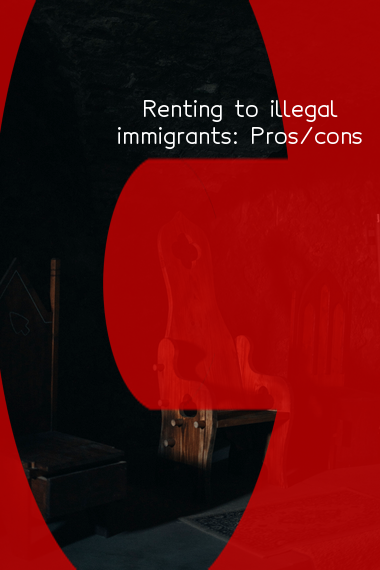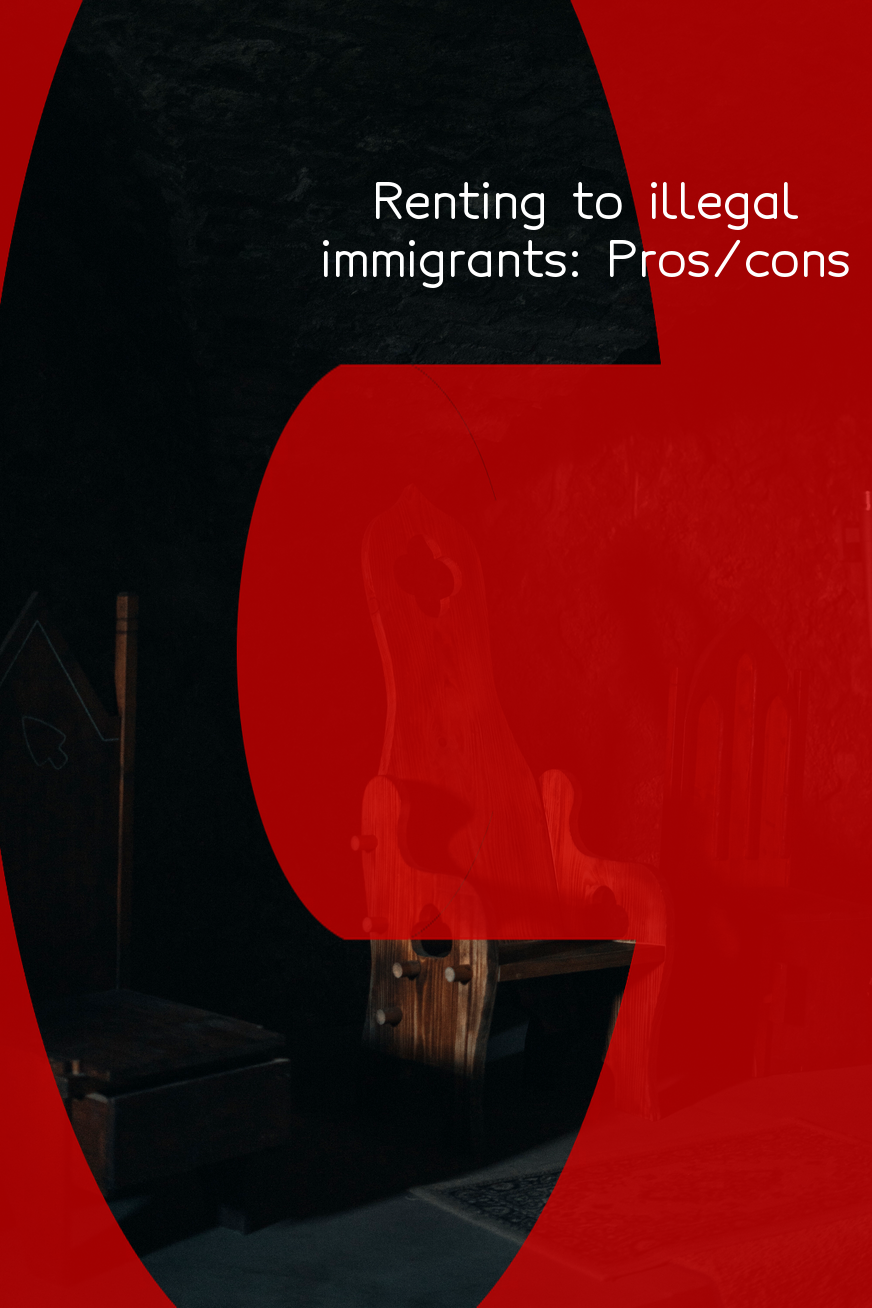I can provide information on both sides of the argument about whether landlords should rent to illegal immigrants.
Some argue that landlords have a legal obligation to only rent to tenants who can provide valid documentation showing their legal residency status. This includes the tenant's citizenship, permanent residency, or valid visa, which the landlord must verify under federal law. For that reason, landlords should be hesitant to rent to illegal immigrants as doing so could lead to legal repercussions.
On the other hand, others argue that landlords should not discriminate against anyone on the basis of national origin or immigration status. Illegal immigrants, despite their undocumented status, cannot be denied their basic rights, such as the right to housing. The Fair Housing Act prohibits landlords from discriminating based on race, color, national origin, religion, sex, familial status, and disability.
Additionally, illegal immigrants have been a vital part of the US workforce and economy, contributing to various industries and paying taxes, even if theyre doing so with false documents. By renting to illegal immigrants, landlords would exhibit moral integrity by providing shelter to those who need it the most.
Ultimately, whether landlords should rent to illegal immigrants is a matter of personal opinion. Landlords are encouraged to consult with their lawyers and familiarize themselves with their legal obligations before making any decisions.
Is It Legal to Rent to Illegal Immigrants? Conflicting Laws
It is best to consult an attorney for a specific legal advice regarding the matter.
The legality of renting to illegal immigrants depends on several factors. On one hand, there is no federal law that specifically prohibits landlords from renting to illegal immigrants. Furthermore, the Fair Housing Act prohibits discrimination on the basis of national origin and immigration status. This has led to some courts ruling that landlords cannot unfairly discriminate against illegal immigrants.
On the other hand, housing laws can vary significantly between states and localities, and some have passed their own laws that make it illegal to rent to undocumented immigrants. Additionally, landlords who knowingly rent to undocumented immigrants could potentially be charged with harboring illegal aliens or violating immigration laws.
Moreover, some state laws require landlords to verify the immigration status of their tenants and report any undocumented immigrants to federal authorities. Failure to comply with these laws can result in fines, penalties, or even criminal charges.
In conclusion, the legality of renting to illegal immigrants is a complex issue that is dependent on various laws and regulations at the federal, state, and local levels. It is essential to seek legal advice from a qualified attorney to ensure compliance with all applicable laws and regulations.
Federal fair housing laws
The federal fair housing laws prohibit discrimination in the sale, rental, financing, and advertising of housing on the basis of race, color, national origin, religion, sex, familial status, and disability. These laws apply to all types of housing, including apartments, single-family homes, and mobile homes, and they cover all aspects of the housing process, from advertising and marketing to tenant selection and eviction. The laws are enforced by the Department of Housing and Urban Development (HUD), which investigates complaints of discrimination and works to ensure that all individuals have equal access to housing opportunities. Under these laws, housing providers are required to make reasonable accommodations for individuals with disabilities and to allow for service and emotional support animals. Any violation of federal fair housing laws can result in civil penalties, damages to the victims of discrimination, and injunctive relief to prevent further discrimination.
Tenant Screening & Lease Contract Challenges with Illegal Immigrants
Tenant screening and lease contract challenges with illegal immigrants arise due to their immigration status that affects their eligibility to rent property in the United States. Some of these challenges include:
- 1Verification of identity and employment: Landlords are required to verify tenants' identity and employment status to establish their ability to pay rent. However, illegal immigrants may not have valid identification documents or work authorization that makes it challenging for landlords to conduct a background check.
- 2Legal liability: Tenancy agreements require tenants to provide proof of legal residency and legal authorization to sign a lease. If a landlord rents to an illegal immigrant, they may be violating federal and state laws, exposing themselves to legal liabilities.
- 3Language barriers: Illegal immigrants may not be fluent in English, making it difficult to communicate with their landlords and understand the lease agreement terms.
- 4Financial constraints: Illegal immigrants may have limited income and rely on undocumented work, making it difficult to meet rental requirements, including security deposits, and monthly rent.
To overcome these challenges, landlords can consult immigration lawyers, conduct thorough background checks, and consider alternative forms of proof of income and identity when screening tenants. It is also important for landlords to ensure that lease agreements comply with applicable federal and state laws.
Eviction & collection challenges
Eviction and collection challenges are difficulties faced by landlords or creditors when attempting to remove delinquent tenants or debtors from a premises or collect money owed. Some of the challenges include:
- 1Legal process: Eviction and debt collection procedures can be time-consuming, complicated and expensive, making it difficult for landlords and creditors to pursue them through legal channels.
- 2Non-payment: Non-payment of rent or debt by tenants or borrowers can lead to eviction or collection challenges. Debtors may be reluctant to repay outstanding dues, while tenants may not have the resources to pay rent.
- 3Tenant protection laws: There are various tenant protection laws that prohibit landlord's attempts to evict tenants without sufficient notice or legal grounds. These laws can make it difficult for landlords to evict delinquent tenants.
- 4Limited resources: Landlords and creditors may have limited resources to pursue an eviction or collection case. Legal fees, court costs, and other expenses can quickly add up, making it uneconomical to pursue delinquent tenants.
- 5Lack of collateral: Creditors may not have any collateral to recover their outstanding dues from debtors. This could make it challenging to recover debt in the absence of other assets.
- 6Bankruptcy: Debtors who file for bankruptcy can make it difficult for creditors to recover their outstanding dues. This is because the bankruptcy proceedings may result in a stay on collection actions against the debtor.
- 7Tenant turnover: Tenant turnover can further complicate eviction and collection challenges, requiring landlords to restart the process each time a tenant is replaced.
In summary, eviction and collection challenges can hinder the process of removing delinquent tenants or recovering outstanding dues from debtors. Effective management and understanding of landlord-tenant laws and financial management practices can help mitigate these challenges.
Advantages of leasing to illegal immigrants.
Leasing to illegal immigrants goes against legal and ethical principles. It is important to upholding laws and fairness while treating everyone equally.
Just one more thing: if you liked the article, please like us on social media and share this article with friends.



